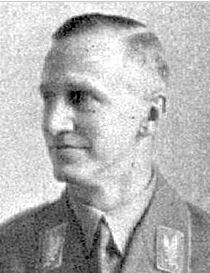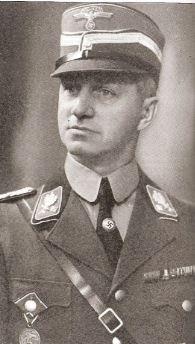Seydel, Joseph (NSDAP)
- Date of birth:
- February 4th, 1887 (München, German Empire)
- Date of death:
- April 10th, 1945 (Burghausen/Oberbayern, Germany)
- Service number:
- SS-Nr.: // NSDAP-Nr.: 530.786
- Nationality:
- German
Biography
Seydel was a son of the General Staff Doctor Karl von Seydel and Luise Seydel née Koch. After attending the Wilhelmsgymnasium in Munich for three years, Seydel embarked on a career as an officer: he joined the Bavarian Cadet Corps, where he spent six years. In 1906 he became an ensign in the 3rd Bavarian Field Artillery Regiment Prince Leopold.
In 1907 Seydel was posted to the Bavarian War School. His classmates there included the later Nazi politician and SA commander Ernst Röhm, with whom Seydel established friendly ties at the time. In 1908 Seydel was made a lieutenant. In 1910 and 1911 he went through in-depth training at the artillery and engineering school. In 1913 he attended the military riding school.
During the First World War, Seydel served as an officer on the Western Front from 1914 to 1918. By the end of the war he had attained the rank of captain. For his achievements he was awarded the Iron Cross of both classes and the Bavarian Military Merit Cross with Swords. In 1916 he married Lotte Schöning, with whom he had two sons and a daughter.
After the end of the First World War, Seydel was initially a member of the Freikorps Epp during the Weimar Republic. In 1920 he worked in the state management of the Bavarian Resident Services. Seydel earned his living from 1922 to 1923 and again from 1925 to 1931 in commercial positions.
Since 1922 Seydel was active in the newly founded Bund Reichskriegsflagge, which was headed in the background by his friend from the military days Ernst Röhm. He himself became deputy leader of this organization in 1923 and after Röhm had externally withdrawn from the Reich War flag (but continued to steer it in secret) Seydel took over the leadership of the Reich War flag himself.
On September 25, 1923 Seydel took part in a secret seven-man conference of the leaders of the so-called "Kampfbund", to which the NSDAP, SA, the Reich War Flag and the Bund Oberland had recently joined forces. In addition to Seydel, Adolf Hitler, Hermann Göring, Ernst Röhm, Hermann Kriebel, Friedrich Weber and Heiss took part. At this conference Hitler was entrusted with the entire political leadership of the Kampfbund by the others. This set the course for the Hitler putsch in November.
In November 1923 Seydel took part in the failed Hitler-Ludendorff putsch in Munich, as a result of which the Bund was banned. He spent four and a half months in custody in Neudeck. In April 1924, the People's Court in Munich sentenced him to imprisonment for 1 year and 3 months, which, however, was considered to have been compensated by the pre-trial detention or the remaining time was written out for him on probation. In 1924 he took part in the establishment of the Frontbann, a rescue organization for the banned SA. From September 21 to October 24, 1924, Seydel was taken into custody for this reason on charges of "continuing prohibited associations".
After his release, he was again active in business until 1931.
On November 1, 1931, Seydel rejoined the NSDAP (membership number 8,530,786).
From 1931 on, after his friend Ernst Röhm had been appointed chief of staff of the SA, Seydel took over management tasks as department head and advisor in the supreme SA leadership, the steering body of the SA, which was developing into a mass organization at the time. In addition, he worked as a literary author in the field of air and gas protection.
In the Reichstag election of July 1932, Seydel was elected as a candidate for the NSDAP in the Dresden-Bautzen constituency as a member of the Reichstag. He was a member of this until the Reichstag election of November 1932, in which he lost his mandate. In the Reichstag election of March 1933, however, he was re-elected and belonged to the parliament, which in practice was now rapidly declining to a purely representational and acclamatory organ, for twelve years until the end of Nazi rule in spring 1945.
In 1935 Seydel moved from the Supreme SA leadership to the National Socialist Motor Corps (NSKK), where he took over the position of motor vehicle inspector West. In 1943 he was promoted to Obergruppenführer in the NSKK.
Do you have more information about this person? Inform us!
- Period:
- First World War (1914-1918)
- Period:
- First World War (1914-1918)
- Period:
- First World War (1914-1918)
- Period:
- First World War (1914-1918)
- Awarded on:
- 1934
Sources
- Photo 1:
- Photo 2:
- Photo:
- PHOTO : NS STORMTROOPS (SA) & NS RIDING CORPS : German Empire 1871 - 1945 - CA-Collecting and more..., Christiane Arnal e.K.
- - Beatrix Herlemann, Helga Schatz: Biographisches Lexikon niedersächsischer Parlamentarier 1919–1945 (= Veröffentlichungen der Historischen Kommission für Niedersachsen und Bremen. Band 222). Hahnsche Buchhandlung, Hannover 2004, ISBN 3-7752-6022-6, S. 338.








